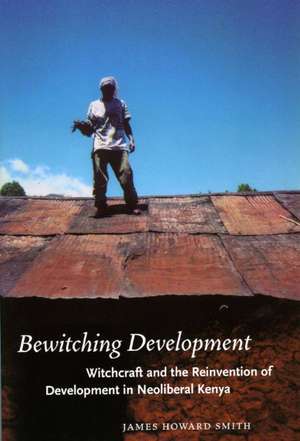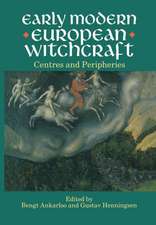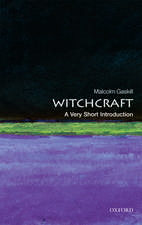Bewitching Development: Witchcraft and the Reinvention of Development in Neoliberal Kenya: Chicago Studies in Practices of Meaning
Autor James Howard Smithen Limba Engleză Paperback – 14 aug 2008
These days, development inspires scant trust in the West. For critics who condemn centralized efforts to plan African societies as latter day imperialism, such plans too closely reflect their roots in colonial rule and neoliberal economics. But proponents of this pessimistic view often ignore how significant this concept has become for Africans themselves. In Bewitching Development, James Howard Smith presents a close ethnographic account of how people in the Taita Hills of Kenya have appropriated and made sense of development thought and practice, focusing on the complex ways that development connects with changing understandings of witchcraft.
Similar to magic, development’s promise of a better world elicits both hope and suspicion from Wataita. Smith shows that the unforeseen changes wrought by development—greater wealth for some, dashed hopes for many more—foster moral debates that Taita people express in occult terms. By carefully chronicling the beliefs and actions of this diverse community—from frustrated youths to nostalgic seniors, duplicitous preachers to thought-provoking witch doctors—BewitchingDevelopment vividly depicts the social life of formerly foreign ideas and practices in postcolonial Africa.
Similar to magic, development’s promise of a better world elicits both hope and suspicion from Wataita. Smith shows that the unforeseen changes wrought by development—greater wealth for some, dashed hopes for many more—foster moral debates that Taita people express in occult terms. By carefully chronicling the beliefs and actions of this diverse community—from frustrated youths to nostalgic seniors, duplicitous preachers to thought-provoking witch doctors—BewitchingDevelopment vividly depicts the social life of formerly foreign ideas and practices in postcolonial Africa.
Din seria Chicago Studies in Practices of Meaning
-
 Preț: 231.82 lei
Preț: 231.82 lei -
 Preț: 282.53 lei
Preț: 282.53 lei -
 Preț: 200.26 lei
Preț: 200.26 lei -
 Preț: 183.60 lei
Preț: 183.60 lei -
 Preț: 236.64 lei
Preț: 236.64 lei -
 Preț: 186.32 lei
Preț: 186.32 lei -
 Preț: 229.35 lei
Preț: 229.35 lei -
 Preț: 217.71 lei
Preț: 217.71 lei -
 Preț: 260.44 lei
Preț: 260.44 lei -
 Preț: 268.20 lei
Preț: 268.20 lei -
 Preț: 246.07 lei
Preț: 246.07 lei -
 Preț: 284.66 lei
Preț: 284.66 lei -
 Preț: 230.16 lei
Preț: 230.16 lei -
 Preț: 292.28 lei
Preț: 292.28 lei -
 Preț: 403.00 lei
Preț: 403.00 lei - 23%
 Preț: 669.93 lei
Preț: 669.93 lei -
 Preț: 242.40 lei
Preț: 242.40 lei -
 Preț: 392.77 lei
Preț: 392.77 lei - 15%
 Preț: 195.04 lei
Preț: 195.04 lei - 9%
 Preț: 287.12 lei
Preț: 287.12 lei - 17%
 Preț: 166.70 lei
Preț: 166.70 lei - 14%
 Preț: 199.02 lei
Preț: 199.02 lei - 18%
 Preț: 178.07 lei
Preț: 178.07 lei - 19%
 Preț: 148.73 lei
Preț: 148.73 lei - 22%
 Preț: 433.25 lei
Preț: 433.25 lei - 18%
 Preț: 152.10 lei
Preț: 152.10 lei
Preț: 237.74 lei
Nou
Puncte Express: 357
Preț estimativ în valută:
45.50€ • 49.40$ • 38.22£
45.50€ • 49.40$ • 38.22£
Carte tipărită la comandă
Livrare economică 23 aprilie-07 mai
Preluare comenzi: 021 569.72.76
Specificații
ISBN-13: 9780226764580
ISBN-10: 0226764583
Pagini: 272
Ilustrații: 5 halftones, 3 line drawings
Dimensiuni: 152 x 229 x 20 mm
Greutate: 0.39 kg
Editura: University of Chicago Press
Colecția University of Chicago Press
Seria Chicago Studies in Practices of Meaning
ISBN-10: 0226764583
Pagini: 272
Ilustrații: 5 halftones, 3 line drawings
Dimensiuni: 152 x 229 x 20 mm
Greutate: 0.39 kg
Editura: University of Chicago Press
Colecția University of Chicago Press
Seria Chicago Studies in Practices of Meaning
Notă biografică
James Howard Smith is assistant professor of anthropology at the University of California, Davis.
Cuprins
Preface
Chapter One: Bewitching Development: The Disintegration and Reinvention of Development in Kenya
Chapter Two: I Still Exist! Taita Historicity
Chapter Three: Development’s Other: Witchcraft as Development through the Looking Glass
Chapter Four: “Each Household Is a Kingdom”: Development and Witchcraft at Home
Chapter Five: “Dot Com Will Die Seriously!” Spatiotemporal Miscommunication and Competing Sovereignties in Taita Thought and Ritual
Chapter Six: Development, Witchcraft, and the Sovereign Child
Chapter Seven: Democracy Victorious: Exorcising Witchcraft from Development
Chapter Eight: Conclusion: Tempopolitics, Or Why Development Should Not be Defined as the Improvement of Living Standards
Notes
References
Index
Chapter One: Bewitching Development: The Disintegration and Reinvention of Development in Kenya
Chapter Two: I Still Exist! Taita Historicity
Chapter Three: Development’s Other: Witchcraft as Development through the Looking Glass
Chapter Four: “Each Household Is a Kingdom”: Development and Witchcraft at Home
Chapter Five: “Dot Com Will Die Seriously!” Spatiotemporal Miscommunication and Competing Sovereignties in Taita Thought and Ritual
Chapter Six: Development, Witchcraft, and the Sovereign Child
Chapter Seven: Democracy Victorious: Exorcising Witchcraft from Development
Chapter Eight: Conclusion: Tempopolitics, Or Why Development Should Not be Defined as the Improvement of Living Standards
Notes
References
Index
Recenzii
“Critiques of development abound (most notably offered by proponents of development), as do assertions of the links between magic and modernity. In his exceptional ethnography, James Smith goes beyond the standard anthropological practice of ‘localizing’ these overarching abstractions. Instead, he revitalizes discussion by demonstrating how development provides a lens through which to examine a host of challenging problems, both historical and contemporary, at the regional, national, and, indeed, global level in Kenya. Moreover, Smith develops a highly innovative, and undoubtedly useful way of framing development, not as a measure of economic indicators, but as part of a wider politics of time, as Kenyans (and plainly many others) worry about ‘falling behind’ and ‘getting ahead’ on scales and increments that are interpersonal and political. Words like magical and bewitching are not only the themes of Smith’s work, they also capture the character of his deeply grounded, highly illuminating anthropological interpretations.”
“Bewitching Development offers a challenging approach to the issue of development and its relationship with witchcraft. In people’s perceptions they are as opposed as for outside experts—yet in daily practice they become intertwined in intriguing ways. In analyzing this shifting balance of opposition and interaction Smith succeeds in opening up new perspectives on both development and witchcraft. His innovative interpretations will have a profound influence on ongoing debates since they touch upon urgent issues—the ambivalent appropriation of development from below, marked by the continuing dynamics of ideas about the occult.”
"Smith's book valuably portrays the moral mess of local social development in Kenya (and elsewhere in Africa). . . . A book that should be read by all dedicated Africanists."










